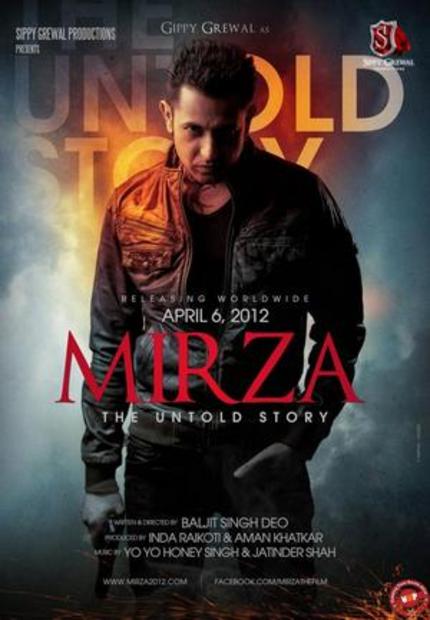Review: MIRZA - THE UNTOLD STORY

Mirza Sahiban is one of the most famous stories in Punjabi literature, and one whose origin goes back hundreds of years. It is a story that has been told and retold for generations, so when a film takes up this tale and labels it The Untold Story, ears were certainly perking up among the millions of Punjabis worldwide. The traditional story is one of forbidden love, revenge, and tragedy; not unlike many legendary folk tales from the world over, but this tragic ending is a bit notorious, because of a twist at the end that gives the story a part of its name.
Baljit Singh Deo's adaptation of the story is actually more faithful than one might expect. However, his execution is another matter entirely. Slavishness to every nook and cranny of the Mirza Sahiban story results in a remarkably limp film, with numerous technical deficiencies that cripple the film just when the crowd should be cheering. In short, Mirza - The Untold Story may have a great story, but it is not a very good film at all. In fact, the audience with which I shared the film giggled on several occasions that presumably were not intended by the filmmakers. That's a bad sign.
The trailer for Mirza sold the film based upon its action sequences. Well, there certainly are a lot of those to choose from, the problem is that none of them are very good. The fight choreography is completely amateurish, with everyone constantly throwing haymakers that clearly don't make contact but still manage to send their opponents flying through the air. Don't even get me started on the underworld bodyguards flinching every time they fire a gun. A helpful hint, you don't need to shoot ALL the guns, guys, just a few done well will suffice. At a certain point very early on, however, in the right mood, one could certainly fall in love with the style of action in this film. It would require a kind of significant suspension of disbelief, but many of us are willing to make that leap from time to time.
If the film were all action, there wouldn't be much to complain about, however, two hours and forty five minutes later, I just felt beaten down. The thing is, there is no reason that the film needed to be that long. Between a combination of Zack Snyder-esque abuse of slow-motion and confoundingly sloppy editing, the film could have easily dropped a half an hour, and that's without losing any story. Every fight scene is slowed down-sped up-slowed down-sped up to the point of absurdity, and anytime we are expected to connect emotionally with the characters on screen, the director simply leaves the camera on the actor for anywhere from 5 seconds to two full minutes too long. It is really strange and completely ineffective, turning tender moments into leering eyes and tearful confessions into hystrionics.
There are some films for which lingering on a performer is a wise and effective choice, however, those films don't star Punjabi pop star Gippy Grewal and Mandy Takhar. These two just don't have the stuff to carry those kind of sequences. Gippy Grewal acquits himself unexpectedly well, in spite of his handicaps, at least until it's time to fight, anyway. Mandy, on the other hand, seems to have three looks on screen, and she seems to constantly be choosing the wrong one for the scene she's in. Not to mention the fact that Baljit Singh Deo had the poor girl crying more than anyone I've seen in a film in a long time. Both actors are saddled with some ungraceful dialogue, and deliver it in about as decent a manner as can be expected. As for the other performers, I'm surprised there was any set left by the end of the shoot considering the impressive displays of scenery-chewing in this film.
At some point, I began to look at Mirza as an challenge of my dedication to Indian cinema. Theoretically, it has everything I love. Overblown melodrama, ridiculous frequent action, ridiculous (and I do mean RIDICULOUS) out of place comedic subplots, songs, and lots and lots of crying, screaming, and scowling. It's like a personalized checklist, except that everyone one of those elements is executed with all the finesse of a backyard wrestling match. One tone is smashed up against the next with no regard for transition or continuity, turning both into dilutions. Can I come out of this unscathed?
Thankfully, the answer in this case is yes. In spite of itself, Mirza has a few entertaining moments, and even its gravest misfires are worthy of note. If only the damned thing weren't so long, I might even be able to recommend it. However, as it is, this is going to be for the diehards only. If you know the Mirza Sahiban story, you'll find your chances to cheer, cry, and relate. If you don't, the story will be hopelessly confusing and lack the kind of cultural context that would render it tolerable. Enter at your own risk.

Do you feel this content is inappropriate or infringes upon your rights? Click here to report it, or see our DMCA policy.






